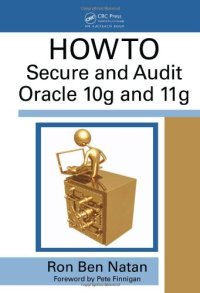
Ebook: HOWTO Secure and Audit Oracle 10g and 11g
Author: Ron Ben-Natan
Oracle is the number one database engine in use today. The fact that it is the choice of military organizations and agencies around the world is part of the company’s legacy and is evident in the product. Oracle has more security-related functions, products, and tools than almost any other database engine. Unfortunately, the fact that these capabilities exist does not mean that they are used correctly or even used at all. In fact, most users are familiar with less than twenty percent of the security mechanisms within Oracle.
Written by Ron Ben Natan, one of the most respected and knowledgeable database security experts in the world, HOWTO Secure and Audit Oracle 10g and 11g shows readers how to navigate the options, select the right tools and avoid common pitfalls. The text is structured as HOWTOs addressing each security function in the context of Oracle 11g and Oracle 10g.
Among a long list of HOWTOs, readers will learn to:
- choose configuration settings that make it harder to gain unauthorized access
- understand when and how to encrypt data-at-rest and data-in-transit and how to implement strong authentication
- use and manage audit trails, and advanced techniques for auditing
- assess risks that may exist and determine how to address them
- make use of advanced tools and options such as Advanced Security Options, Virtual Private Database, Audit Vault, and Database Vault.
The text also provides an overview of cryptography, covering encryption and digital signatures and shows readers how Oracle Wallet Manager and orapki can be used to generate and manage certificates and other secrets.
While the book’s seventeen chapters follow a logical order of implementation, each HOWTO can be referenced independently to meet a user’s immediate needs. Providing authoritative and succinct instructions highlighted by examples, this ultimate guide to security best practices for Oracle bridges the gap between those who install and configure security features and those who secure and audit them.